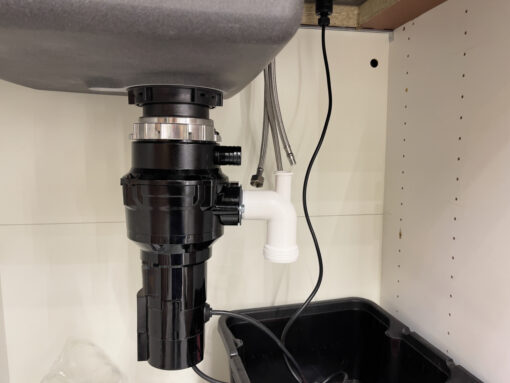
A garbage disposal is one of the most convenient appliances in your kitchen. It helps you efficiently get rid of food waste, saving you from the hassle of composting or throwing things out. However, like all appliances, it requires proper maintenance to function optimally. Without it, your disposal can quickly become clogged, inefficient, and even prone to breakdowns. By following a few simple tips, you can keep your garbage disposal running smoothly and avoid costly plumbing repairs.
1. Regularly Clean Your Garbage Disposal
Just like any other appliance, regular cleaning is essential to keep your garbage disposal in good working condition. Over time, food particles, grease, and bacteria can accumulate, leading to unpleasant odors, clogs, and inefficient performance.
- What to Do: Grind Citrus Peels: To freshen up your garbage disposal and remove odors, grind citrus peels (like lemon or orange) in the disposal. The acidity helps break down debris while leaving a fresh, clean scent.
- Ice Cubes and Salt: Grinding ice cubes and a handful of salt is another simple way to clean your disposal. The ice helps dislodge any trapped particles, and the salt acts as a natural abrasive to scrub away grease and grime.
- Baking Soda and Vinegar: For deeper cleaning, pour a cup of baking soda down the disposal followed by a cup of vinegar. Let it sit for 15–20 minutes, then rinse with hot water to eliminate odors and clear debris.
2. Avoid Putting Certain Foods Down the Disposal
While garbage disposals are designed to handle most food scraps, certain items can cause clogs or damage the unit over time. Avoid putting the following down the disposal to prevent future plumbing problems:
- What Not to Put in the Garbage Disposal: Grease and Oil: These liquids can solidify and cause blockages in the disposal and your plumbing pipes.
- Fibrous Vegetables: Foods like celery, corn husks, and asparagus can get tangled in the blades, causing a clog.
- Starchy Foods: Potatoes, rice, and pasta can expand when wet and create a thick paste, which can clog your disposal.
- Eggshells: While some people claim that grinding eggshells helps clean the disposal, they can actually build up in the pipes and cause blockages.
- Coffee Grounds: Coffee grounds can clump together and form sludge in your disposal, leading to clogs and slow drainage.
3. Run Cold Water While Using the Disposal
A common mistake people make when using their garbage disposal is running hot water instead of cold water. Hot water can cause fats, oils, and grease to liquefy, which will then harden in the pipes once they cool down, causing clogs. Cold water helps solidify grease and allows it to be chopped up into smaller pieces before being flushed through the drain.
- What to Do: Run Cold Water: Always run cold water while grinding food waste to help push it through the disposal and plumbing.
- Keep the Water Running: Let the water run for about 15–20 seconds after grinding to make sure the waste is thoroughly flushed through the drain.
4. Be Mindful of What You Put in the Disposal
Even though a garbage disposal can handle a variety of food waste, it’s important to be mindful of the amount and type of waste you’re putting in. Overloading the disposal can cause the motor to strain, which might result in clogging or even damage the unit.
- What to Do: Feed Waste Gradually: Instead of dumping a large amount of food waste at once, feed smaller portions of waste to avoid overloading the disposal.
- Cut Large Food Items into Smaller Pieces: If you have large bones, fruit pits, or large chunks of food, cut them into smaller pieces to prevent clogging and unnecessary strain on the motor.
5. Use a Disposal Cover
Using a disposal cover can help prevent large objects from falling into the disposal accidentally. It also keeps your disposal cleaner by preventing food particles from splashing back up when running it.
- What to Do: Install a Disposal Cover: Consider purchasing a disposal cover that fits your unit. It’s an easy and inexpensive way to protect your disposal from debris and extend its lifespan.
6. Schedule Regular Professional Maintenance
Even with proper care, your garbage disposal can benefit from professional maintenance. A plumber can perform routine inspections, remove any tough clogs, and ensure that your unit is functioning as it should.
- What to Do: Get an Annual Inspection: To avoid the need for emergency repairs, have your garbage disposal professionally inspected once a year.
- Call a Professional for Repairs: If your garbage disposal is making strange noises, leaking, or not working efficiently, it’s time to call a professional plumber.
Keep Your Garbage Disposal Running Smoothly
A well-maintained garbage disposal can save you time, reduce waste, and make kitchen cleanup a breeze. By following these simple tips—regular cleaning, avoiding harmful food waste, and running cold water during use—you can keep your garbage disposal functioning properly for years to come.
If you encounter persistent clogs, strange noises, or plumbing issues with your garbage disposal, don’t hesitate to call Top Tier Plumbing and Rooter. Our experienced plumbers can provide thorough inspections, repairs, and maintenance to ensure your disposal is working efficiently.
Call us today at (951) 475-6521 for all your plumbing needs, including garbage disposal repairs and installations!

